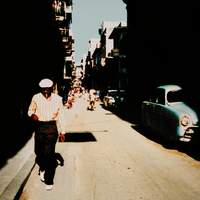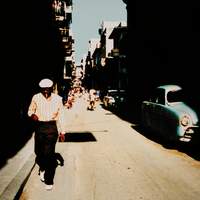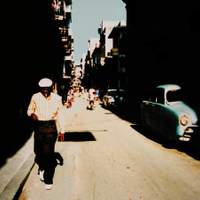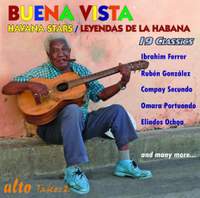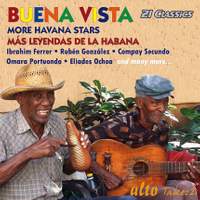Classic Recordings,
Buena Vista Social Club

With its 25th anniversary just around the corner and a deluxe reissue from its original label on the way, now seems as good a time as any to take a look back at this Cuban jazz classic, 1997’s Buena Vista Social Club. Not an organically-formed group per se, rather the venture of World Circuit record executive Nick Gold, with the assistance of rock guitarist and record producer Ry Cooder, the Buena Vista Social Club ‘band’ was assembled from local Cuban musicians while the two were out in Havana to record another project. Originally planning a collaborative record between two musicians from Malia and a handful of Cuban players, when the African musicians couldn’t make it to Havana due to visa problems, the two instead opted to enlist more local musicians for a wholly Cuban-focussed project.
The group itself was named after the members’ club of the same name in Havana’s Buenavista district, a popular venue from the pre-revolutionary era. Before the Cuban Revolution, life on the island nation was separated into ‘sociedades de blancos’ (White societies) and ‘sociedades de negros’ (Black societies), with the Buenavista club being a musical hub for Afro-Cuban musicians to congregate and play music, dance and drink together. Post-revolution Cuba brought the abolishment of segregation and integration of social spaces, but also the closing of many nightlife establishments by the newly-elected - and devoutly Catholic - president Manuel Urrutia Lleó, with the Buenavista club being one of these many closures. This, combined with the new interest in rock and pop music in Cuban culture, contributed to the decline in interest in traditional Cuban music, and by the time Buena Vista Social Club released in 1997, the style had been mostly dormant.

The album itself was actually the second of three recordings made in 1996 by World Circuit, Ry Cooder and a similar circle of musicians; the first being A Toda Cuba le Gusta (‘All of Cuba Likes It’), and the third Introducing...Rubén González, the first album released by the Cuban pianist since his 1975 debut, all releasing within the same year as one another. The Buena Vista band itself was directed by Cuban musician Juan de Marcos González, who played an essential role in the formation of Buena Vista Social Club. González grew up learning both classical and tres guitar, a three-course Cuban guitar, later studying orchestral conducting and contemporary harmony at Goldsmiths college in London. Though González was a fan of British and American rock acts in his youth, he came to rediscover his Cuban roots in adulthood and formed the band Sierra Maestra - named after the south-eastern mountain range - a group dedicated to re-establishing the traditional Cuban sound of ‘son Cubano’, in 1978. González’s time with Sierra Maestra proved to be a key component in the Buena Vista project, using his connections in the Cuban music scene to locate and recruit the musicians, many of whom were long-retired veterans.
While to Western listeners the label of ‘Cuban jazz’ is likely specific enough, the material covered on Buena Vista Social Club covers many different styles within Cuban music. From the slower, syncopated sounds of danzón to improvisatory descarga and distinctive clave rhythm of son cubano, all standards from the country’s rich musical tradition, sometimes penned by the very people playing on the record. The songs chosen for Buena Vista Social Club are predominantly standards of Cuban origin, typically compositions that originated in small guitar-led ensembles, some even written by the same musicians featured on the recording. The son composition ‘Chan Chan’, the opening track and perhaps most recognisable song from the record, became something of a musical calling card for the group; originally written in 1984 by Compay Segundo, it was first recorded in 1985 by Segundo’s band but sat unreleased by EGREM - the national record label of Cuba - until the latter half of the 90s, by which point the Buena Vista project was already underway. Other pieces, like the title track - written prior to the project as a tribute to the music venue of the same name - was in fact written by Israel “Cachao” López, the uncle of Orlando "Cachaíto" López, who plays bass on this album; the Cuban music scene is a tight-knit one, apparently. Naming tunes in tribute to local music venues was something of a tradition, too, and it was ultimately Cooder that decided it would be the perfect name for the project.

Buena Vista Social Club didn’t just reignite the international interest in Cuban and Latin-American music, it directly contributed to an increase in Cuban tourism in the late ‘90s. While there’s no doubt that it taps into a deliberate nostalgia and romanticisation of a pre-revolutionary Cuban culture - it is the project of a British record label and American rock musician, after all - the wide-spanning appreciation of the record remains. It seems it took the influence of the ‘Western’ record industry to highlight just a handful of the musicians living in Cuba. And it still lives on; a handful of the surviving members of the troupe still tour today as the Orquesta Buena Vista Social Club. This timeless classic celebrates its 25th anniversary next year, with World Circuit releasing deluxe editions this week on CD and vinyl.
Available Format: 2 CDs
Available Format: 2 Vinyl Records
Available Format: 4 Vinyl Records
If that's not enough Buena Vista for you, you may be interested in these recordings released by Alto, by many of the same musicians...
Buena Vista: Leyendas de la Habana
Ibrahim Ferrer, Compay Secundo, Ruben Gonzalez, Omara Portuondo, Eliades Ochoa, Tersa Garcia Caturla, Raul Planas & Nico Saquito
Available Format: CD
Buena Vista: More Havana Stars
Ibrahim Ferrer, Ruben Gonzalez, Compay Secundo, Omara Portuondo, Eliades Ochoa, Nico Saquito Al Bate, Beny More, Juan Formell
Available Format: CD


